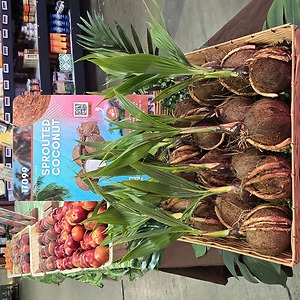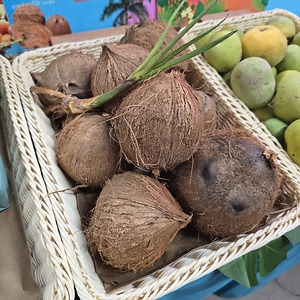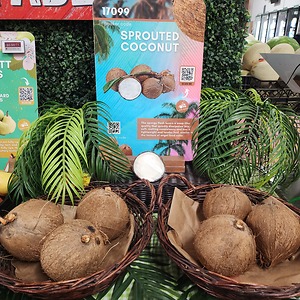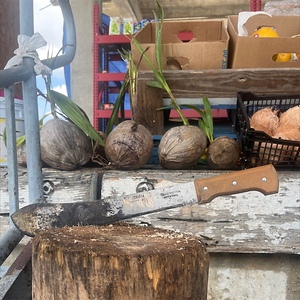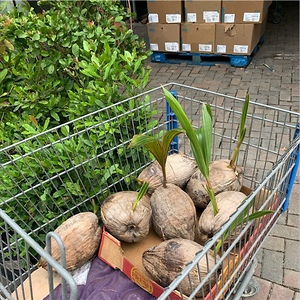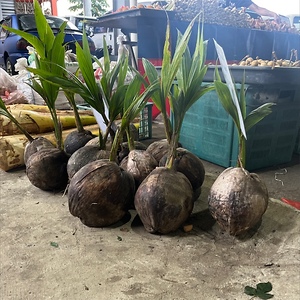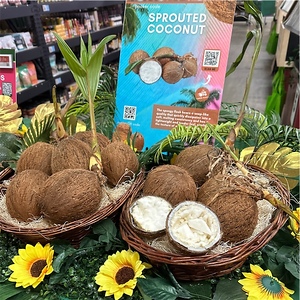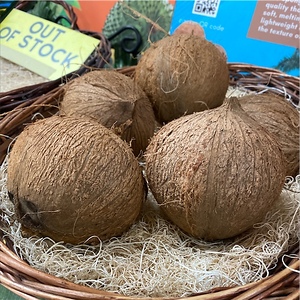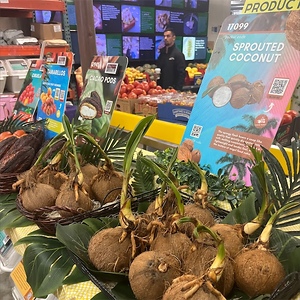

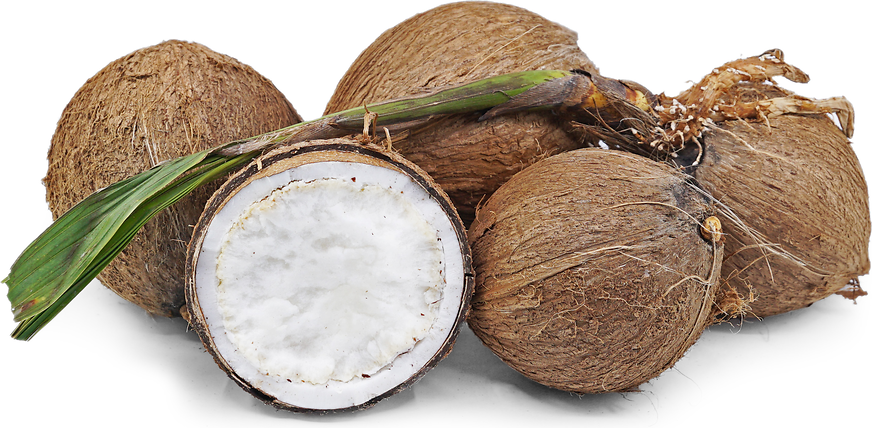
Sprouted Coconut
Estimated Inventory, ea : 0
This item was last sold on : 05/20/25
Description/Taste
Sprouted coconuts are small to medium in size, averaging thirty centimeters in diameter and thirty-eight centimeters in length, and are oval to oblong in shape with many layers of protective shell. The dark brown husk, also known as the mesocarp, is thick, fibrous, brittle, and firm. This outer shell is very similar in appearance to a mature coconut seen on the tree, but a Sprouted coconut is distinguished by its location, having fallen off the tree to the ground, sometimes bearing a small root and a slender, green shoot. Underneath the husk, a grey-brown, inedible shell surrounds the core known as the endocarp and has three germination pores or eyes on the stem-end. Inside the endocarp, a thin layer of slippery, crisp white meat encased in coconut oil surrounds a thick, sponge-like flesh with a yellow, grooved exterior and a pure white interior. The spongy flesh bears a snap-like quality that quickly dissipates into a soft, melting consistency and has a lightweight and tender feel, similar to the texture of angel food cake. Sprouted coconuts have a faint, musky aroma that is sometimes unnoticeable. The spongy flesh has a very mild, sweet, and savory taste mixed with a tangy, subtle salinity reminiscent of the flavor of coconut water.
Seasons/Availability
Sprouted coconuts are available year-round in tropical climates.
Current Facts
Sprouted coconuts, botanically classified as Cocos nucifera, are a very mature, common coconut belonging to the Arecaceae family. These coconuts are found on the ground beneath the tree, and the coconuts have begun to sprout, allowing the seed inside the shell to consume the water, developing into a solid, spongy mass. Also known as the Coconut Apple, Jungle Bread, and Queen’s Bread, Sprouted coconuts are typically ready for consumption 1 to 4 months after dropping from the tree. If left to grow, they would eventually become a new tree. Sprouted coconuts have been present since ancient times but were primarily localized to tropical communities, discovered as a naturally occurring food source. With the rise of global market expansion, social media, and nutritional awareness, Sprouted coconuts have seen a recent increase in popularity in vegan and gourmet markets for their light, crisp texture, sweet and savory flavor, and rich nutritional value.
Nutritional Value
Sprouted coconuts are an excellent source of vitamin C to strengthen the immune system and are rich in omega-3 and omega-6 fatty acids. The mature coconuts also contain fiber to stimulate the digestive tract, potassium to balance fluid levels within the body, iron to build the protein hemoglobin to transport oxygen through the blood, and lower amounts of copper and vitamin A.
Applications
Sprouted coconuts are best suited for raw applications as their crisp and airy flesh is showcased when used fresh. The spongy flesh is commonly sliced and served as a stand-alone snack, and the pieces can be dredged in the layer of coconut oil encased in the shell for added flavor. The flesh can also be cubed and mixed into fruit salads, green salads, lightly dipped in sauces and dressings, or mashed, cooked, and baked. In the To Live For! recipe book created by Chef Eric Rivkin on www.vivalaraw.org, Rivkin recommends cubing Sprouted coconuts for croutons, slicing and dipping pieces into vegan Swiss fondue, or hollowing the center and using it as an edible bowl for fruit or mango curry. Rivkin also uses the coconut in watermelon cakes and simple desserts such as flan. Sprouted coconuts pair well with fresh vegetables and fruits such as sprouts, cucumbers, carrots, red onions, tomatoes, mango, strawberry, pineapple, and guava, and can also be served with vegan-based meats, chickpeas, tofu, fish, and poultry. The flesh should be consumed immediately for best quality and flavor, and if left unfinished, it should be stored in the refrigerator for 1 to 2 days.
Ethnic/Cultural Info
Coconuts are an important symbol in many tropical cultures around the world, often called the “tree of life.” Earning the name Queen’s Bread in Hawaii, Sprouted coconuts were believed to give energy as they contained the entire life force of a new tree, and royalty would consume the flesh to share the energy with the rest of the village. Continuing this tradition, Sprouted coconuts are trending in modern-day vegan markets for their rich “life-giving” nutritional value. In India and Thailand, the coconuts are sliced open at local markets and are consumed fresh, out of hand, and in Borneo, the slices are sprinkled with chile and salt for added flavor. In Costa Rica, Chef Eric Rivkin has been leading the Sprouted coconut movement by incorporating the wild food in his culinary classes at the Viva La Raw Project on the off-grid, sustainable La Joya del Sol farm. The Sprouted coconuts are foraged from local beaches and are transformed into many unique raw dishes such as Sprouted coconut filled with homemade sunflower seed nut butter, jaboticaba jam, and red banana as a version of a peanut butter and jelly sandwich. Sprouted coconuts are also being used as an alternative to bread by Miami Fruit in the United States, formed into “burger buns” and showcased at vegan produce festivals as healthy sandwiches layered with tomatoes, cucumbers, vegan patties, and lettuce.
Geography/History
Coconuts originated in India and Southeast Asia thousands of years ago and spread naturally via ocean currents and by human hand on ancient trade routes. Early Arab traders first brought coconuts to East Africa, where they became well established among native peoples. The silk road linked coconuts to Europe, and with further colonization and slave trade, the trees were soon brought to the Caribbean. Today, the Philippines is the largest producer of coconuts, and the fruits can grow in tropical climates all around the world. Sprouted coconuts can loosely be categorized as foraged food because they are not cultivated but rather occur naturally in the wild, almost accidentally and often overlooked. To meet increasing demand, farms such as Miami Fruit in Florida have expanded the tropical market by naturally cultivating and shipping Sprouted coconuts to consumers in different geographical climates across the United States. In partnership with Miami Fruit, Sprouted coconuts can also be found through Specialty Produce.
Recipe Ideas
Recipes that include Sprouted Coconut. One
| Kripa's food diary |
|
Munge Dosey/Coconut Sprout Dosa |
| across the shore |
|
SPROUTED COCONUT BREAD |



